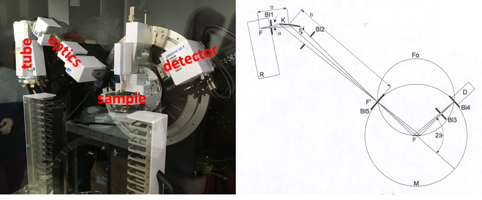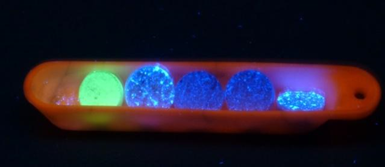ECTS
120 credits
Duration
2 years
Training structure
Faculty of Science
Language(s) of instruction
French
Presentation
This program provides training that introduces students to the concepts and tools used in solution chemistry, extraction and separation chemistry, development, and materials and process science, in the context of research and development activities, particularly in relation to the nuclear fuel cycle and the recycling of strategic metals.
90 to 100%
Success rate
The advantages of the training program
International outreach: training program certified by the International Institute for Nuclear Energy (I2EN) in 2019.
Strong mutualization of teaching with the third-year Chemistry for Nuclear Energy and the Environment (CNE) option at the Ecole Nationale Supérieure de Chimie de Montpellier (ENSCM).
Objectives
Graduates are trained for careers in industry and research related to the fields of separation chemistry, materials, and processes, particularly in the nuclear sector (fuel cycle, reactor operation, radiation protection and safety, waste management, decontamination, and decommissioning) or strategic metal recycling (extractive and separation chemistry, reprocessing).
The educational content of this program is spread over two years, with knowledge being acquired gradually in the various disciplines and a precise chronological sequence of teaching units, enabling the provision of high-level specialized and multidisciplinary education. The aim is to acquire scientific and technical knowledge as well as working methods and communication tools.
Know-how and skills
Upon completion of this program, graduates will have acquired the scientific and technical skills necessary to:
- Recognize the challenges associated with the upstream fuel cycle, particularly those relating to extractive and separative chemistry, ore processing, and remediation of mined and/or contaminated sites.
- Be familiar with the various laws governing the nuclear sector in terms of radiation protection, control, safety, and waste management.
- Be able to understand the chemical properties of radioelements and radionuclides, and address the scale factors associated with the trace scale (indicator chemistry and environmental chemistry).
- Be able to use simple models to evaluate the performance of a strategic metal separation process.
- Be able to understand the life cycle of a material in relation to the properties required under conditions of use.
- Mastering scientific and technical communication tools
Upon completion of this program, graduates will have acquired disciplinary and interdisciplinary knowledge and expertise in: radiochemistry, radioelement analysis, fuel cycle, reprocessing, extraction and separation processes for strategic metals, waste storage and disposal management, materials chemistry (development, structure, properties), fuel materials and waste containment matrices, nuclear safety and radiation protection, decontamination, dismantling of nuclear facilities, remediation of contaminated soil, etc.
Organization
Internships, supervised projects
Internship | Mandatory |
|---|
M1 – Semester 1: Professional Projects – Project Monitoring (8 ECTS)
M1 – Semester 2: Communication and Professional Integration (2 ECTS)
M1 – Semester 2: 2- to 4-month internship in a laboratory or company, preceded by a bibliographic report (10 ECTS)
M2 – Semester 3: Project Management – Business Law – Innovation and Intellectual Property (4 ECTS)
M2 – Semester 4: Bibliographic Project / Scientific Information (3 ECTS)
M2 – Semester 4: 4- to 6-month internship in a laboratory or company (25 ECTS)
Program
The Master's program is spread over four semesters, each worth 30 ECTS credits, in accordance with the European system.
Each teaching unit is assessed either in the form of a final written exam, continuous assessment, or, for certain vocational teaching units, a written summary and oral presentation.
These teaching units can be compensated for each other. An average of 10/20 or higher for the entire semester is required for validation. Semesters cannot be compensated for each other.
Select a program
M1 - Separative Chemistry, Materials, and Processes (MAT P2)
OPTION 1
4 creditsChoose 2 out of 3
Supplements in solution chemistry
2 creditsCrystallography I
2 creditsThermodynamics and phase equilibria
2 credits
Basic elements of radioactivity
2 creditsPolymers
2 creditsChemistry of solutions applied to actinides
2 creditsAdvanced inorganic materials
2 creditsSolutions, colloids, interfaces
2 creditsLiquid NMR spectroscopy and X-ray diffraction
2 creditsChemometrics, statistical data analysis, experimental design
2 creditsMethodology for characterizing materials
2 creditsCoordination chemistry and organic chemistry
2 creditsProfessional projects – project monitoring
8 credits
Chemistry at the scale of indicators - Radiochemistry
2 credits2-4 month internship (bibliography included)
10 creditsInnovative synthesis and extraction processes
2 creditsRadiation protection / radiation-matter interaction
2 creditsOPTION 2
4 creditsChoose 2 out of 3
Fundamentals of Process Engineering
2 creditsHybrid and structured materials
2 creditsContainment materials
2 credits
Liquid-liquid extraction: kinetics and thermodynamics
2 creditsHigh-temperature chemistry
2 creditsCommunication and professional integration
2 creditsFuel cycle: from mining to waste management
2 creditsCoordination chemistry of f-elements
2 credits
M2 - Separative Chemistry, Materials, and Processes (MAT P2)
Irradiation of nuclear materials
2 creditsProject management - Business law
4 creditsPractical work
2 credits20hSupramolecular chemistry of the f and d elements
2 creditsAnalytical strategy for radionuclides
2 creditsModeling for separation and containment
2 creditsSynthesis and remanufacturing of combustible materials
2 creditsReprocessing and direct storage of nuclear fuels
2 creditsUpstream of the cycle: extractive and separative chemistry
2 creditsSeparative chemistry
2 creditsGlass matrices: synthesis and long-term behavior
2 creditsDecommissioning and decontamination processes
2 creditsMembrane separation and liquid extraction processes
2 creditsRadioactivity and the environment
2 credits
Advanced English
2 creditsBibliographic project/Scientific information
3 credits4-6 month internship
25 credits
Admission
Registration procedures
Applications can be submitted on the following platforms:
French & European students:
- For the M1, follow the "My Master's Degree" procedure on the website:https://www.monmaster.gouv.fr/
- For M2 students, applicants must submit their application via the e-candidat application:https://candidature.umontpellier.fr/candidature
International students from outside the EU: follow the "Études en France" procedure:https://pastel.diplomatie.gouv.fr/etudesenfrance/dyn/public/authentification/login.html
Target audience
Admission to M1: selection based on application. Holder of a bachelor's degree in chemistry, physical chemistry, process engineering, or equivalent. Validation of prior learning by a panel for other scientific bachelor's degrees.
Admission to M2: selection based on application. Holder of a Master 1 degree in chemistry, physical chemistry, process engineering, or equivalent. Validation of prior learning by a panel for other scientific Master's degrees.
Capacity
20 in M1 and M2
Mandatory prerequisites
Skills in chemistry or physical chemistry.
Recommended prerequisites
Skills in solution chemistry and materials chemistry
Proficiency in French is an additional asset for international students.
And after
Continuing education
Doctoral thesis or Master's degree for the acquisition of dual skills.
Continuing studies abroad
Doctoral thesis.
Gateways and reorientation
Bridge programs: admission based on application for Master's 2 for candidates with a Master's 1 in chemistry or equivalent training.
Reorientation: reorientation possible at the end of the Master 1 year.
Professional integration
Business sectors:
- Chemistry for Nuclear Power (upstream and downstream fuel cycle, waste management, decontamination and dismantling operations)
- Extractive and separative chemistry, chemistry for the reprocessing and recycling of strategic metals
- Energy, environment, chemistry
- Materials chemistry and process chemistry
Types of jobs available:
- Chemical engineer, materials chemist, or process chemist responsible for production, analysis, quality control, or project management
- R&D engineer in a design office or in the nuclear industry, recycling industry, or environmental sector
- Researcher/R&D or research engineer (after completing a PhD, which this program prepares students for): conducting scientific studies and implementing technological projects




